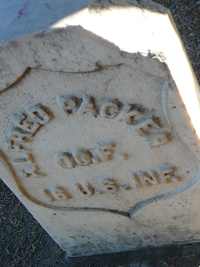Alfred G. “Alferd” Packer
Colorado Cannibal
January 21, 1842 – April 23, 1907
 The story of Alferd Packer, The Colorado Cannibal, never ceases to surprise and entertain. Alferd was born Alfred G. Packer in Allegheny County, Pennsylvania on January 21st, 1842. He served for a short time in the Union Army during the Civil War. After being discharged for epilepsy, he decided to try his hand at prospecting out West.
The story of Alferd Packer, The Colorado Cannibal, never ceases to surprise and entertain. Alferd was born Alfred G. Packer in Allegheny County, Pennsylvania on January 21st, 1842. He served for a short time in the Union Army during the Civil War. After being discharged for epilepsy, he decided to try his hand at prospecting out West.
In November of 1873 Packer joined 20 other men leaving Salt Lake City, Utah and heading for Colorado. In January, they made it to what is now the present day town of Delta, CO. There they met Chief Ouray of the Utes who advised the men wait until Spring to travel into the mountains because of hazards with deep snow and severe weather. Alferd did not want to wait. He persuaded five other men to continue the journey.
Alferd and his companions left the Ute Indians on February 9th with 10 days worth of provisions. 65 days later, Alferd Packer arrived at the Los Piños Indian Agency (which is roughly 25 miles south of present day Gunnison, CO) alone, carrying a Winchester rifle, with no other traveling companions in sight. General Charles Adams welcomed him and offered him food. He reportedly refused this offer of breakfast and said he’d been subsisting on rosebuds and roots. Packer relayed the harsh and horrible tale of his survival in the wild after running out of provisions. At first he claimed to have been abandoned by his companions after falling ill. General Adams continued to inquire about the fate of those he traveled with but Packer’s tale did not change.
After going on a drinking binge and spending spree one evening, Adams again questioned Packer about his survival, the missing companions, and the sudden acquisition of money to spend so freely. Adams suspicions were raised . By now it was thought thatAlfred Packer murdered and robbed his companions as the Winchester rifle he carried into town was recognized as having belonged to his companion Israel Swan. Adams ordered Alferd to head a search party to look for the bodies of these missing men, but he led them to nothing.
 Later, one of the Ute tribe discovered a hunk of human flesh not too far from the agency near the trail that led Packer into town. This evidence convinced everyone that Alfred Packer, indeed, killed those in his traveling party and subsisted on their flesh.
Later, one of the Ute tribe discovered a hunk of human flesh not too far from the agency near the trail that led Packer into town. This evidence convinced everyone that Alfred Packer, indeed, killed those in his traveling party and subsisted on their flesh.
This was confirmed the following year when an artist for Harpers Weekly, while on vacation in the area, stumbled upon five partially decomposed bodies of men near the banks of the Gunnison River; some had head wounds from what appeared to be a hatchet and all had parts of their flesh cut away from the bone. The news of this discovery reached the town just three days after Alferd escaped from jail.
In April 1883, 9 years later, Alferd Packer was spotted in Wyoming, returned to Lake City, tried, and convicted of murder connected with cannibalism. He is oddly revered as Colorado’s first cannibal, and received Colorado’s first death sentence in the state. Though a stay of execution was granted and he eventually got off on a technicality. He was tried again in 1886, this time for five counts of manslaughter and received a 40 year sentence for his crimes. He was paroled in 1901, due to poor health, and died in 1907. He is buried inLittleton Cemetery, south of Denver.
Packer’s legend does not stop there, however. There are several movies, songs, and theater productions covering The Colorado Cannibal’s life and deeds. Most notable, perhaps, is a film called Cannibal! The Musical made by South Park co-creator Trey Parker. Several museums have Packer memorabilia on display, and the plateau above Lake City is now known as Cannibal Plateau. Ironically, legend has it that Alferd became a vegetarian in later life. I think I will just let that statement lie, if you know what I mean.
There is also interesting information from David P. Bailey, Curator of History at the Museum of Western Colorado, that potentially proves that Alfred Packer was innocent. Please read this intriguing article to find out more.
Note: The spelling of Alfred Packer‘s name has been the source of a lot of confusion. I’ve used both interchangeably. It appears that while “Alfred” appeared on many official documents, he did go by “Alferd” much of the time.
Special Thanks To:
- Wikipedia – Alfred “Alferd” G. Packer
- Colorado’s Strangest by Kenneth Jessen
- Find a Grave – Alfred Packer
- Colorado State Archives – Alfred Packer Photo
- Museum of Western Colorado – Was Alfred Packer Innocent of Murder?
- HauntedColorado.net – Packer and Lake City
For giving me invaluable information in my research of this story!
“Packer, ye man-eatin’ son of a bitch, they was seven dimmycrats in Hinsdale County and ye eat five of ’em, God damn ye!”
-Larry Dolan, saloon keeper in Lake City


